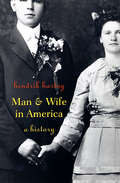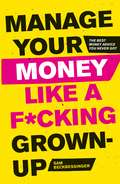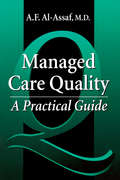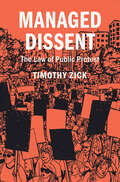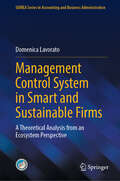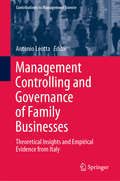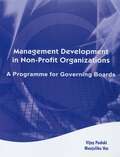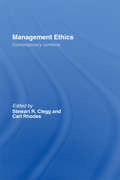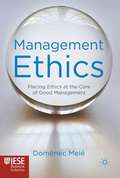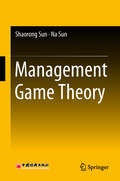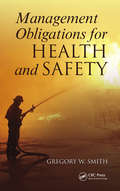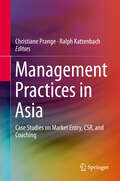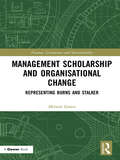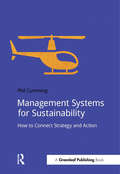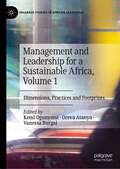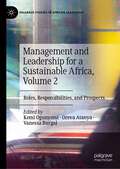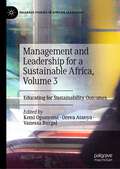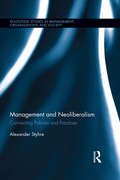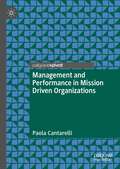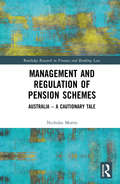- Table View
- List View
Man and Wife in America: A History
by Hendrik HartogIn nineteenth-century America, the law insisted that marriage was a permanent relationship defined by the husband's authority and the wife's dependence. Yet at the same time the law created the means to escape that relationship. How was this possible? And how did wives and husbands experience marriage within that legal regime? These are the complexities that Hendrik Hartog plumbs in a study of the powers of law and its limits. Exploring a century and a half of marriage through stories of struggle and conflict mined from case records, Hartog shatters the myth of a golden age of stable marriage. He describes the myriad ways the law shaped and defined marital relations and spousal identities, and how individuals manipulated and reshaped the rules of the American states to fit their needs. We witness a compelling cast of characters: wives who attempted to leave abusive husbands, women who manipulated their marital status for personal advantage, accidental and intentional bigamists, men who killed their wives' lovers, couples who insisted on divorce in a legal culture that denied them that right. As we watch and listen to these men and women, enmeshed in law and escaping from marriages, we catch reflected images both of ourselves and our parents, of our desires and our anxieties about marriage. Hartog shows how our own conflicts and confusions about marital roles and identities are rooted in the history of marriage and the legal struggles that defined and transformed it.
Man for Himself: An Inquiry Into the Psychology of Ethics (Routledge Classics Ser.)
by Erich Fromm&“There is no meaning to life except the meaning man gives his life by the unfolding of his powers.&” —Erich FrommAre we primarily determined by nature or nurture? What are the best ways that people can live productively? In Man for Himself, renowned social philosopher Erich Fromm posits: With the gifts of self-consciousness and imagination, any individual can give his or her own unique answer. This answer is rooted in our human nature, and should correspond to mankind&’s powers of reason and love. Therefore, Fromm reasons, &“living itself is an art.&” In his humanistic concept of man, Fromm describes various character orientations that are to be found in Western culture. For the first time, Fromm analyzes the parallels between economic concepts of market value and how we value others and ourselves—the idea of personality as a commodity. He argues for a return to humanistic ethics, and discusses issues such as the question of conscience, of selfishness and self-love, and of pleasure and happiness. This ebook features an illustrated biography of Erich Fromm including rare images and never-before-seen documents from the author&’s estate.
Man in His Original Dignity: Legal Ethics in France (Routledge Revivals)
by John LeubsdorfThis title was first published in 2001. This work explores the professional standards of the French bar as it moves, rapidly but with misgivings, into a world of competition, organization and globalism. It focuses on the ideology of French legal ethics in its historical and social contexts, rather than the details of the rules governing avocats. Those rules are technical and, in many respects, similar to the rules in effect in the USA. But lawyers in France and the United States base their rules on strikingly different pictures of lawyers. French avocats classify their duties as a series of virtues - probity, honour and delicacy - to follow one official formulation. By contrast, lawyers in the USA, to judge from the way they justify their rules, consider their fellows scoundrels who, without regulation, would cheat their clients, opposing parties and other lawyers. The author's goal is to describe, in their cultural and institutional contexts, the professional ideals of the French bar as it remembers its past and faces its future.
Man or Citizen: Anger, Forgiveness, and Authenticity in Rousseau (G - Reference, Information and Interdisciplinary Subjects)
by Karen PaganiThe French studies scholar Patrick Coleman made the important observation that over the course of the eighteenth century, the social meanings of anger became increasingly democratized. The work of Jean-Jacques Rousseau is an outstanding example of this change. In Man or Citizen, Karen Pagani expands, in original and fascinating ways, the study of anger in Rousseau’s autobiographical, literary, and philosophical works. Pagani is especially interested in how and to what degree anger—and various reconciliatory responses to anger, such as forgiveness—functions as a defining aspect of one’s identity, both as a private individual and as a public citizen. Rousseau himself was, as Pagani puts it, “unabashed” in his own anger and indignation—toward society on one hand (corrupter of our naturally good and authentic selves) and, on the other, toward certain individuals who had somehow wronged him (his famous philosophical disputes with Voltaire and Diderot, for example). In Rousseau’s work, Pagani finds that the extent to which an individual processes, expresses, and eventually resolves or satisfies anger is very much of moral and political concern. She argues that for Rousseau, anger is not only inevitable but also indispensable, and that the incapacity to experience it renders one amoral, while the ability to experience it is a key element of good citizenship.
Man's Best Friend: The inspiring true story of Sergeant Luke Warburton, his police dog Chuck and the crime-busting Dog Unit
by Simon Bouda Luke WarburtonAt 10.30 p.m. on 12 January 2016 Acting Sergeant Luke Warburton thought he was taking his last breath. A decorated New South Wales Police Officer, the father of three was looking death in the face after a bullet pierced his femoral vein. If it wasn't for the fact that it happened in the Emergency Ward of Sydney's Nepean Hospital, Warburton would probably have been dead already. An hour earlier, he'd walked to his police van with his ever-faithful German shepherd, Chuck, trotting alongside. Later, Luke would be awarded the Commissioner's Valour Award for conspicuous merit and exceptional bravery in the line of duty. He would maintain he was just a copper doing his job. So, too, was Chuck, who was nationally recognised for bringing down Australia's most wanted man, Macolm Naden, after a manhunt lasting more than seven years.Man's Best Friend is Luke and Chuck's story. It's the story of a boy who dreamed of one day being a policeman, of his love for dogs and his time at the NSW Police Dog Unit. It's also the story of an ordinary man and his ordinary dog doing extraordinary things in the line of duty.
Manage Your Money Like a F*cking Grown-Up: The Best Money Advice You Never Got
by Sam BeckbessingerYou're going to earn plenty of money over your lifetime. Are you going to waste it on stupid crap that doesn't make you happy, or let it buy your freedom and your most audacious dreams?We never get an instruction manual about how money works. Most of what we learn about money comes from advertising or from other people who know as little as we do. No wonder we make such basic mistakes. No wonder we feel disempowered and scared. No wonder so many of us just decide to stick our heads in the damn sand and never deal with it. In Manage Your Money Like a F*cking Grown Up, Sam Beckbessinger tells it to you straight: how to take control of your money to take control of your life.In this clear and engaging basic guide to managing your finances, you will learn: - How to trick your dumb brain into saving more, without giving up fun- How to make a bona fide grown-up budget- Why you need to forget what you've learned about credit- How to negotiate a raise- Why buying a house (probably) won't make you rich- The one super-simple investment you needWith helpful exercises, informative illustrations (also: kittens) and straightforward advice, this book doesn't shy away from the psychology of money, and is empowering, humorous and helpful. The book you wish you'd had at 25, but is never too late to read.
Manage Your Money Like a F*cking Grown-Up: The Best Money Advice You Never Got
by Sam BeckbessingerYou're going to earn plenty of money over your lifetime. Are you going to waste it on stupid crap that doesn't make you happy, or let it buy your freedom and your most audacious dreams?We never get an instruction manual about how money works. Most of what we learn about money comes from advertising or from other people who know as little as we do. No wonder we make such basic mistakes. No wonder we feel disempowered and scared. No wonder so many of us just decide to stick our heads in the damn sand and never deal with it. In Manage Your Money Like a F*cking Grown Up, Sam Beckbessinger tells it to you straight: how to take control of your money to take control of your life.In this clear and engaging basic guide to managing your finances, you will learn: - How to trick your dumb brain into saving more, without giving up fun- How to make a bona fide grown-up budget- Why you need to forget what you've learned about credit- How to negotiate a raise- Why buying a house (probably) won't make you rich- The one super-simple investment you needWith helpful exercises, informative illustrations (also: kittens) and straightforward advice, this book doesn't shy away from the psychology of money, and is empowering, humorous and helpful. The book you wish you'd had at 25, but is never too late to read.
Managed Care Quality: A Practical Guide
by A. F. Al-Assaf R. Robyn AssafManaged care organizations are paving the way to the future of health care delivery in the United States and countries around the world. As managed care systems evolve, a major concern is quality. Managed Care Quality: A Practical Guide is a collection of applications and experiences gathered from practicing health professionals in the field of managed care. This first "how to" guide was written to help managed care organizations meet the common objective of ensuring the best quality of services and care. Managed Care Quality: A Practical Guide presents successive steps in implementing quality in health care organizations. It introduces the methods, skills, and practices involved in quality health care programs and offers solutions to problems typically encountered in managed care.
Managed Dissent: The Law of Public Protest (Cambridge Studies on Civil Rights and Civil Liberties)
by Timothy ZickThe mass street demonstrations that followed the 2020 police murder of George Floyd were perhaps the largest in American history. These events confirmed that even in a digital era, people rely on public dissent to communicate grievances, change public discourse, and stand in collective solidarity with others. However, the demonstrations also showed that the laws surrounding public protest make public contention more dangerous, more costly, and less effective. Police fired tear gas into peaceful crowds, used physical force against compliant demonstrators, imposed broad curfews, limited the places where protesters could assemble, and abused 'unlawful assembly' and other public disorder laws. These and other pathologies epitomize a system in which public protest is tightly constrained in the name of public order. Managed Dissent argues that in order to preserve the venerable tradition of public protest in the US, we must reform several aspects of the law of public protest.
Management Control System in Smart and Sustainable Firms: A Theoretical Analysis from an Ecosystem Perspective (SIDREA Series in Accounting and Business Administration)
by Domenica LavoratoIn today's competitive environment, smart technologies are increasingly recognized as key enablers of corporate sustainability. In this new context, corporate management control systems integrate with the issues of smart technologies, sustainability and inter- and intra-organizational collaboration as the driving elements of the firm of the future. This book proposes a management control framework for today's firms. It investigates the effectiveness of traditional management control systems in today’s competitive environment and identifies potential limitations that may hinder their ability to effectively monitor modern organizations. Furthermore, the book explores whether these systems can be improved with complementary tools or if entirely new mechanisms are required. The book argues the need to adopt a new approach to control and a different lens for evaluating the activity of guiding the achievement of corporate objectives, paving the way for the conceptualization of a new management control system.
Management Controlling and Governance of Family Businesses: Theoretical Insights and Empirical Evidence from Italy (Contributions to Management Science)
by Antonio LeottaThis book addresses a selection of major topics in family businesses, namely ‘managerialization’ and ‘professionalization’, succession, internationalization, access to financial markets, and how governance and control systems can help family firms respond to common problems inherent in the business. Written by prominent experts, the respective chapters highlight the interactions between these topics in order to develop a systems view of the distinctive challenges, and of the potential roles that governance and control systems can play in these contexts. The book is divided into two main parts, the first of which reviews the current literature and develops a comprehensive theoretical framework. Based on these theoretical insights, the second part then interprets and discusses the empirical evidence, including case studies on family-run firms in Italy.
Management Development in Non-Profit Organisations: A Programme for Governing Boards
by V C Padaki Manjulika VazVoluntary organizations engaged in development efforts are usually immersed in very demanding work in unhelpful conditions. This leaves them little time to come to grips with the specialized demands fof management development. Adding to the difficulty is the prevailing tendency in many non-profits and NGOs to distance themselves from the world of `management`. However, the need for effective management in their work is often greater than in commercial ventures of a similar size. In this context, the governing board can play an important role in the effective management of voluntary organizations, but it is a role that is largely neglected. This book—the first of its kind in India—draws upon the authors` broad experience in consulting to identify the needs of governing boards, and offers a programme designed to meet those needs. This book is a practical, comprehensive and ready reference manual for board members of non-profit organizations (NPOs), covering all the issues involved—from the legal frameworks governing NPOs to useful guidelines on fundraising. Using the `frequently asked questions` format, it covers various aspects of NPO management, with an emphasis on the strategy—policy function of boards.
Management Ethics: Contemporary Contexts (Routledge Companions In Business, Management And Accounting Ser.)
by Stewart R. Clegg Carl RhodesEthics has become big business but have businesses become ethical? This is a central question for today’s managers. Managing ethics is critical in an era characterized by unprecedented corporate power and a myriad of competing ethical traditions. Giving new insights into the understanding of ethics for today’s organization practice and managerial behaviour, this timely volume, edited by well-respected industry authorities, provides an overview and critique of ethics as they relate to contemporary challenges and issues (such as globalization, sustainability, consumerism, neo-liberalism, corporate collapses, leadership and corporate regulation). This book, an essential read for postgraduate students of business and ethics, is organized around the core question: What are the ethics of organizing in today’s institutional environment and what does this mean for the practice of management and the organization of business? In response to this, the contributors examine ethics as it is deeply embedded in the everyday practice of management. Interdisciplinary contributions from the fields of sociology, philosophy, management, organization studies and public administration provide unique perspectives, while case studies and real-life examples illustrate the challenges and dilemmas faced in practice. Each chapter has a brief overview and editor’s introduction which skilfully summarizes key points and draws connections between the chapters.
Management Ethics: Placing Ethics at the Core of Good Management (Palgrave Macmillan IESE Business Collection)
by Domènec MeléThe recent financial crisis has awakened a renewed sensibility to ethics in business and management, and an increasing interest in a better understanding of how ethics and economics are intertwined. Managers and executives must understand not just the moral value of ethical behaviour, but also how this can strengthen and benefit the organization.
Management Game Theory
by Shaorong Sun Na SunThis book primarily addresses various game theory phenomena in the context of management practice. As such, it helps readers identify the profound game theory principles behind these phenomena. At the same time, the game theory principles in the book can also provide a degree of guidance for solving practical problems.As one of the main areas in management research, there is already an extensive body of literature on game theory. However, it remains mainly theoretical, focusing on abstract arguments and purely numerical examples purely. This book addresses that gap, helping readers apply game theory in their actual management or research work.
Management Obligations for Health and Safety
by Gregory W. SmithIn recent years, the safety management field has placed leadership and commitment at the center of effective workplace health and safety programs. At the same time, personal liability for workplace health and safety has increased, resulting in poor outcomes for individual managers. Discussing the minimum expectations that courts and tribunals have
Management Practices in Asia: Case Studies on Market Entry, CSR, and Coaching
by Christiane Prange Ralph KattenbachAsia is a continent of contradictions and boundaries; it offers exciting business opportunities, but is also characterized by unpredictability and conflict. While flexibility and creativity are in the DNA of many startups in China, major players like Xiaomi and Alibaba have also emerged as global giants, challenging established global competitors. The authors of this book show that these companies are crossing various boundaries – between cultures, mindsets, and perspectives. At the same time, Western companies entering Asian markets face challenges that are very different from those on their home turf. This book addresses the needs of current and future managers doing business in Asia, who need to understand the individual, social and business challenges that can arise from crossing boundaries. The respective case studies provide essential insights on how several Asian companies have made impressive strides towards becoming established players; how the revival of local brands and growing pride in local products has become a major challenge for global competition; how the need to actively practice corporate social responsibility in Asian markets is currently challenging many companies; and how the need for individual and team coaching among the members of management to support a company’s development has grown tremendously, calling for new solutions.
Management Scholarship and Organisational Change: Representing Burns and Stalker (Finance, Governance and Sustainability)
by Miriam GreenChange is a crucial and inescapable process for many organisations. It remains a constant challenge for managers and many change management initiatives fail. Burns and Stalker’s seminal text on managing change, The Management of Innovation, has often been used as a basis for research in mainstream management journals and has been represented as an important theory in popular and long-established management textbooks. The issues raised in that book are still being grappled with by academics and practitioners today. Miriam Green provides a critical analysis of the mainstream construction of knowledge on change management through an examination of representations of that text. The main thesis of her book is that this literature, though valuable, does not provide a full picture. Its objectivist approach ignores the role of other factors raised in the original study. These factors include the effects of power, politics, resistance and employee influence on the outcomes of managerial change strategies and on other organisational processes, with important consequences for the understanding of change initiatives by both academics and practitioners. This is part of an ongoing debate in management studies and more widely in the social sciences about theoretical approaches and research methods. The originality of this book lies in its in-depth comparison of an entire monograph on organisations facing technological and commercial change, with an equally in-depth analysis of the ways this work has been represented and used as a basis for teaching and research. It highlights the limitations of the exclusive use of one approach to explain the complications arising from organisational change. It challenges the scientific justification offered for that approach and supports arguments for more inclusive and sustainable scholarship, of greater relevance to academics, managers and other organisational stakeholders.
Management Systems for Sustainability: How to Connect Strategy and Action
by Phil CummingTo deliver on your sustainability ambitions, you need an effective management system. Delivery and results, after all, are what sets leading sustainable businesses apart. Supplementing your existing management arrangements with a management systems approach can play a crucial part in helping to implement more sustainable ways of working. It will help your colleagues understand what sustainability means and how it applies to their role. It will strengthen the link between strategy and action and provide the framework for the various elements of your sustainability strategy to happen. In this short guide, Phil Cumming introduces you to management systems thinking and concepts and sets out clear and practical steps to help you be more formalized and systematic about how and when you do things. This book will help you deliver on your sustainability ambitions – without needing to follow a single management system standard!
Management and Leadership for a Sustainable Africa, Volume 1: Dimensions, Practices and Footprints (Palgrave Studies in African Leadership)
by Kemi Ogunyemi Vanessa Burgal Oreva AtanyaTo effectively deliver sustainable management in practice for Africa, we need responsible leadership. We need to deepen our understanding of sustainability in the unique socio-political and economic context of the continent. The roles of various actors across public, private and non-profit sectors as enablers of sustainable development need to be explored to understand the social, economic and environmental (SEE) trends in Africa and its emerging and developing economies, as well as to chart the way forward for the continent.This first volume focuses on the African understanding of sustainability and its dimensions within its unique historical, social, environmental and political contexts. Through the lens of responsible leadership, the authors reflect on the implementation and extension of the SEE sustainability triad in ways unique to the African continent, especially in relation to the development of well-thought-out, healthy and enduring policy frameworks and the promotion of good governance. The African scope of the book is hinged on collaboration from authors across Africa and the inclusion of case stories from emerging economies in the five African subregions (East, West, North, Central and Southern Africa) within the chapters. The core message is that, to achieve effective and sustainable management and development for Africa, the practice of responsible leadership is critical.
Management and Leadership for a Sustainable Africa, Volume 2: Roles, Responsibilities, and Prospects (Palgrave Studies in African Leadership)
by Kemi Ogunyemi Vanessa Burgal Oreva AtanyaTo effectively deliver sustainable management in practice for Africa, we need responsible leadership. We need to deepen our understanding of sustainability in the unique socio-political and economic context of the continent. The roles of various actors across public, private and non-profit sectors as enablers of sustainable development need to be explored to understand the social, economic and environmental (SEE) trends in Africa and its emerging and developing economies, as well as to chart the way forward for the continent.This second volume explores the roles and responsibilities of the players—leaders and followers—in the core, public purpose and business spheres in delivering sustainable development outcomes for Africa. Drawing on interviews, cases and extensive literature, this volume contributes to reflection on the leadership values and practices required for a sustainable Africa and the crafting of new policy approaches to address the development challenges such as environmental degradation, economic inequities and social exclusion in Africa. The African scope of the book is hinged on collaboration from authors across Africa and the inclusion of case stories from emerging economies in the five African subregions (East, West, North, Central and Southern Africa) within the chapters. The core message is that, to achieve effective and sustainable management and development for Africa, the practice of responsible leadership is critical.
Management and Leadership for a Sustainable Africa, Volume 3: Educating for Sustainability Outcomes (Palgrave Studies in African Leadership)
by Kemi Ogunyemi Vanessa Burgal Oreva AtanyaTo effectively deliver sustainable management in practice for Africa, we need responsible leadership. We need to deepen our understanding of sustainability in the unique socio-political and economic context of the continent. The roles of various actors across public, private and non-profit sectors as enablers of sustainable development need to be explored to understand the social, economic and environmental (SEE) trends in Africa and its emerging and developing economies, as well as to chart the way forward for the continent. This third volume focuses on education as a tool to build a sustainable Africa. It explores the use of pedagogical approaches, learning resources, and policy implementation to develop African leaders and managers with a sustainability mindset that feeds into leadership decision-making, systemic change management, and efficient and sustainable transfers of knowledge and practice. The case stories from various academic institutions present practicable and innovative ideas for educating those who will lead sustainable development for Africa’s future. The African scope of the book is hinged on collaboration from authors across Africa and the inclusion of case stories from emerging economies in the five African subregions (East, West, North, Central and Southern Africa) within the chapters. The core message is that, to achieve effective and sustainable management and development for Africa, the practice of responsible leadership is critical.
Management and Neoliberalism: Connecting Policies and Practices (Routledge Studies in Management, Organizations and Society)
by Alexander StyhreAfter the financial collapse of 2008 and the bailing out of banks in the US and the UK, the long-term viability of the neoliberal doctrine has come under new scrutiny. The elimination of regulatory control, the financialization of the economy including the growth of increasingly complex financial innovations, and the dominance of a rentier class have all been subject to thorough criticism. Despite the unexpected meltdown of the financial system and the substantial costs for restoring the finance industry, critics contend that the same decision-makers remain in place and few substantial changes to regulatory control have been made. Even though neoliberal thinking strongly stresses the role of the market and market-based transactions, the organization theory and management literature has been marginally concerned with neoliberalism as a political agenda and economic policy. This book examines the consequences of neoliberalism for management thinking and management practice. Managerial practices in organizations are fundamentally affected by a political agenda emphasizing competition and innovation. Concepts such as auditing, corporate social responsibility, shareholder value, and boundariless careers are some examples of managerial terms and frameworks that are inextricably entangled with the neoliberal agenda. This book introduces the literature on neoliberalism, its history and controversies, and demonstrates where neoliberal thinking has served to rearticulate managerial practice, including in the areas of corporate governance, human resource management, and regulatory control of organizations.
Management and Performance in Mission Driven Organizations
by Paola CantarelliManagement scholars worldwide increasingly capitalize on theoretical models and research designs from the behavioural sciences to close the implementation gap in mission-driven organisations. This book aims at synthesising the theoretical frameworks and evidence that has flourished over the past decades in order to advance the scholarly debate and the implications for practice in the domains of performance management, information systems, investments strategies, people administration, and change and innovation. It provides meaningful insights to tackle real-world challenges that organizations and their managers face on a daily basis; including why two managers can make radically different decisions in front of the same information, which cognitive traps most often get in the way of good performance management, and how managerial interventions can limit such errors and variability.
Management and Regulation of Pension Schemes: Australia a Cautionary Tale (Routledge Research in Finance and Banking Law)
by Nicholas MorrisPerhaps the greatest long-term challenge facing modern economies is how to pay for the living expenses and care costs of the elderly. Following policy decisions made in Australia in the 1990s, a substantial part of the pension requirements of the next cohort of retirees will be met from savings accumulated during working years. The effective management of these savings is crucial. If they are invested wisely, the assets available to fund pensions and care will grow; if not, available funds may turn out to be insufficient. Unfortunately, there is considerable evidence worldwide that the management of funds attracts rent-seeking behaviour by the financial services industry which erodes much of the potential return. Australia introduced compulsory superannuation contributions for its working population in 1991, leading to a proliferation of funded schemes that are largely run by the private sector. Complexity, and many degrees of separation between fund members and those who manage their funds, have emerged as serious problems. Combined with weak competitive pressures and governance systems, and insufficient legal and regulatory constraints, the result is a system that does not serve its members well. This book provides a detailed evaluation of the Australian experience, highlights the extent to which the financial services industry has extracted rents from Australian pensioners, and how and why this occurred. Based on original empirical research, and examination of industry reviews and relevant literature, the book demonstrates the numerous principal–agent, conflict of interest and rent extraction problems that have emerged in Australia. The book makes suggestions for how these problems can be addressed in Australia, and also provides lessons for other countries wishing to enact pension reform.
